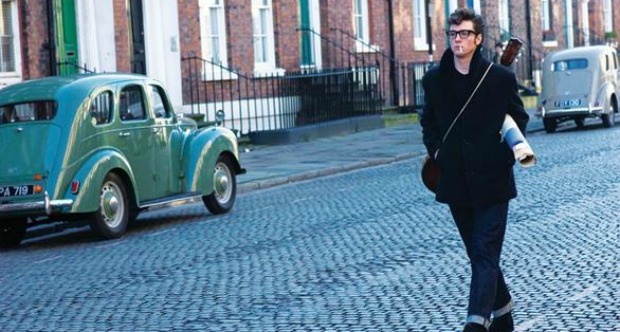Nowhere Boy
A John Lennon biopic that brilliantly focuses not on the Lennon of The Beatles, but the young fifteen year old liverpudlian school boy and the relationships that he forged.
Plot summary
A chronicle of John Lennon's first years, focused mainly in his adolescence and his relationship with his stern aunt Mimi, who raised him, and his absentee mother Julia, who re-entered his life at a crucial moment in his young life.

Sam Taylor Wood’s Nowhere Boy is a John Lennon biopic that brilliantly focuses not on the Lennon of The Beatles, but the young fifteen year old liverpudlian school boy and the relationships that forged the angry, creative genius waiting in hiding.
As the film goes to great lengths to prove, John Lennon’s school days were full of youthful rebellion and classic school boy antics. The very first scene of the film, rather oddly, is a single snippet of John running through town. Is he running away from someone? Has he committed a criminal offence? Or perhaps he just feels the need to run? All three are adequate options but what we can be sure is that it bloody well means something. The film does, however, support such an opening in its highly sensitive portrayal of John’s life which is shaken to its core by his relationships with his mother and aunt.
John (Aaron Johnson) has lived with his Aunt Mimi (Kristin Scott Thomas) and uncle since he was five after his mother Julia, for reasons not yet known, abandoned him. John’s life is one of strict discipline thanks to Mimi’s steely temper and contempt for misbehaviour. John’s best friend is his uncle who helps maintain John’s sanity and keeps Mimi at bay. When his uncle dies, John is heartbroken and must get on with his life alongside Mimi who icily tells him that they must get on with things as they only have each other left. At the funeral, however, a mysterious woman is spotted and John realises that reconciliation with his mother may in fact be possible after all.
Julia Lennon, played wonderfully by Anne-Marie Duff, is discovered as living a mere mile or so from Mimi’s house so John goes to meet the mother he hasn’t seen since he was a child. Julia is a stark contrast to her sister Mimi. She adores rock and roll, idolises Elvis and is generally wild at heart despite being married with two young daughters. John is addicted right away and his transformation is catalysed. The up and down relationship he has with his mother channels a rebelliousness seen only at school into a new passion. Rock and Roll becomes his life and we even see an absurdly clichéd, Grease-esque montage when he transforms his look and his hair into the image of Elvis (‘I’m gonna start a rock and roll group,’ states John, ‘be like Elvis’). We see him first learn ‘Maggie Mae’ (a little ditty he later uses on the Let It Be album), start a skiffle band with his classmates and his first encounters with Paul and George. The film is far more concerned, however, and rightly so, with John, his mother and Auntie.
Aaron Johnson was a fantastic choice for John. He has got the infamous droll scouse accent down perfectly and has enough swagger and charisma to carry the film entirely. However it is the trio of Mimi, Julia and John and their constantly brimming emotions that makes this film a lot more. Their relationships are always near boiling point as John finds it difficult, despite his love for his mother, to deal with the fact she left him all those years ago and everyone finds it difficult to go on without resolving all that is going unsaid. Julia’s bubbly, electric personality is revealed as a defence mechanism for the guilt she understandably feels for abandoning her son and Mimi’s strict, icy persona gets slowly broken down revealing an endearing, nurturing mother figure (supposedly John spoke on the phone every week to Mimi up until his death and even tried to persuade her to move out to America). John himself is ravaged with complex feelings towards both and the trio’s relationship culminates in a superb, highly emotional sequence that reveals how it all got this way and shows a huge amount of subtle complexity in Greenhalgh’s writing and Taylor Wood’s directing. The film becomes almost as much about the sisters as it is about John but, of course, it ultimately gives us a huge insight into the extremely difficult family life that helped mould Lennon into who he became.
The story’s outcome (for those who aren’t familiar with the life of John Lennon I shall not reveal it) is a mightily sad one but puts into motion his career. And for all Beatles fans, I defy you to watch John, Paul and George singing the three part melody to The Quarrymen’s first recording ‘In spite of all the danger’ and not feel a tingle down your spine.
Overall a great biopic that attempts, very successfully, to delve a little deeper emotionally into one of the most iconic figures of all time.











COMMENTS